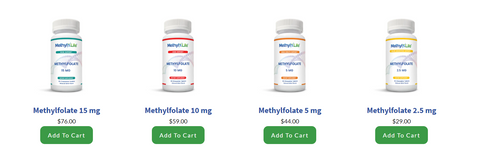L-methylfolate vs Deplin® for Depression: Are They the Same?
Around 8.9 million US adults take medication for depression. Of these, around 2.8 million (30.9%) are affected by treatment-resistant depression (TRD), in which they are unable to find relief with antidepressant medications alone.1 TRD can be extremely distressing for those affected, and can increase the severity of their depressive symptoms.
Fortunately, L-methylfolate may be a solution.
L-methylfolate (vitamin B9) is one of the most important nutrients involved in the production of serotonin, dopamine, and norepinephrine. These neurotransmitters play a vital role in mood management.
Studies show that taking L-methylfolate in supplement form can help to restore neurotransmitter levels in the body, which can then make antidepressant medication more effective.2
L-methylfolate is available as Deplin®, a prescription ‘medical food’ that contains a high dose of L-methylfolate, or as an over-the-counter supplement.
So, how does an L-methylfolate supplement compare to Deplin®? Why would you choose one over the other?














